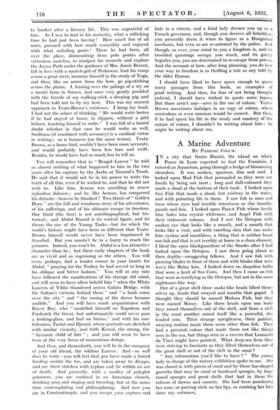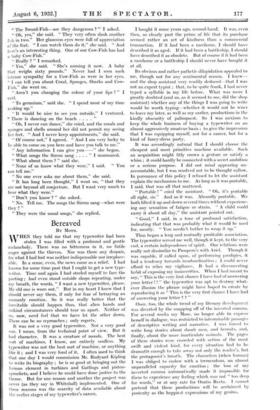A Marine Adventure
BY PADRAIC COLUM.
IN a city that fronts Bimini, the island on which Ponce de Leon expected to find the Fountain, I entered an Aquarium, going through a hedge of blossoming oleanders. It was sunken, spacious, dim and cool. I looked upon Mud Fish that persuaded us they were not fossils by being not inert ; long and dull-coloured they made a shoal at the bottom of their tank. I looked upon Sun Fish that made a shoal, but midway in the water, and with pulsating life in them. I saw fish in ones and twos whose eyes had terrible intentness or else trouble, puzzle and loss. I looked upon Parrot Fish whose lovely blue fades into crystal whiteness, and Angel Fish with their iridescent colours. And I saw the Octopus with sunken eye that looks like a mouth, and a mouth that looks like a vent, and with crawling skin that can make him eyeless and mouthless, a thing that is neither beast nor fish and that is yet terribly at home in a clean element. I liked the open blackguardism of the Sharks after I had looked upon the Octopus. I saw them going about in their depths—swaggering fellows. And 'I saw fish with piercing blades in front of them and with blades that were wavy like Malay kris. I looked down on shapeless bulks that were a herd of Sea Cows. And then I came on fish that were as terrifying as the Octopus, but not in the same nightmare-like way.
Out of a great shell three snake-like heads lifted them • selves up, heads that swayed and mouths that gaped. I thought they should be named Medusa Fish, but they were named Moray. Like three heads upon one body they raised themselves out of the shell, and from a cleft ip the coral another raised itself like a powerful, dis- tended arm. Their strange uprightness,, their patient, swaying motion made them seem other than fish. They had a greenish colour that made them not like things seen in the sea, but things seen in a cavern that Leonardo da Vinci might have painted. What deep-sea lives they were striving to fascinate as they lifted themselves out of the great shell or out of the cleft in the coral ?
"Any information you'd like to have ? " The young lady in charge of the watery exhibition spoke to me. She was closed in with pieces of coral and by those fan-shaped growths that may be coral or hardened sponges, by huge round sponges and great shells that had in them the colours of dawns and sunsets. She had been powdering her nose, or putting stick on her lips, or combing her hair since my entrance, "The Sword-Fish—are they dangerous ? "' I asked.
"Oh, yes," she said. "They very often slash another fish in two." Her glaucous eyes were full of appreciation of the feat. "I can watch them do it," she said. "And here's an interesting thing. One of our Cow-Fish has had a baby Cow-Fish."
Really ? " I remarked.
"Yes," she said. "She's nursing it now. A baby that weighs sixty pounds." Never had I seen such intense sympathy for a Cow-Fish as were in her eyes. "I can tell you about Coral, Sponges, Sharks and Cow- Fish," she went on.
"Aren't you changing the colour of your lips ? " I said.
To geranium," said she. "I spend most of my time making up."
"It would be nice to see you outside," I ventured. "There is dancing on the beach . .
"Oh, I never can dance," she cried, and the corals and sponges and shells around her did not permit my seeing her feet. "And I never keep appointments," she said.
"Of course not," I agreed. "And I am very lucky to be able to come on you here and have you talk to me."
"Any information I can give you " she began. "What songs the Sirens sang . . . . " I murmured. "What about them ? " said she.
"None of us know what they were," I said. " You can tell me."
"No one ever asks me about them," she said.
"It has long been thought," I went on, "that they are not beyond all conjecture. But I want very much to hear what they were."
"Don't you know ? " she asked.
"No. Tell me. The songs the Sirens sang—what were they ? "
"They were the usual songs," she replied.



























 Previous page
Previous page